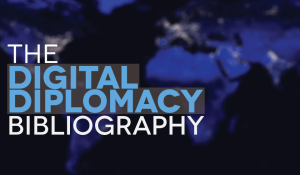Dissertations and Theses on Digital Diplomacy
ABSTRACT: The aim of this thesis is to investigate how American power is adapting to a changing post-Cold War global landscape. It is commonly accepted that many of the most visible cultural expressions of globalization are American. However, contemporary accounts have proven inadequate in assessing how such forces have helped provide the infrastructure for America’s global dominance. With growing debate over the decline of American influence, the thesis intends to address how American statecraft is attempting to redefine itself for a digital age.
ABSTRACT: This paper will build upon recent work that views diplomacy broadly as, among othings, a form of change management in the international system. Change is conceptualized here in two basic forms, top-down exogenous shocks and bottom-up incremental shifting. Diplomacy helps to manage both sources of change, though there is variation in process and tool effectiveness depending on the type of change that states are actively managing e-Diplomacy is defined as a strategy of managing change through digital tools and virtual collaboration.
ABSTRACT: This paper set out to gain insight into the ways Germany and Sweden conduct their public diplomacy on Twitter. It explored the ways in which the organizational structure influences the states’ conduct in social media and shed light on the difficulties that arise when trying to adapt diplomacy to a communicative situation that is said to have changed dramatically. In an exploratory study, this thesis tried to answer the larger question whether and in what way Twitter can be of use to public diplomacy.
ABSTRACT: Social media not only proved to be a powerful medium in influencing the public but also drew the attention of public diplomacy professionals, observers, and political analysts on how it could be positively utilized to enhance a country's image. The research determines the tools used in adopting ICT to cultivate public diplomacy in Kenya, its impact and challenges, and analyzes the successes of adopting ICT into diplomacy in order to ensure efficiency in public participation of government policies and other processes. It adopts the Actor-Network Theory (ANT) as an explanatory framework of analysis. The research outlines its findings in terms of knowledge and expertise in adopting E-diplomacy in Kenya and lays out strategies in curbing challenges such as cybercrime which are inter-twined with ICT.
ABSTRACT: In recent years, there were many conflicts between the United States and China in cyberspace. As shown by Secretary of State Clinton’s “Internet Freedom” speeches, “Blog Briefing” and Google’s withdrawal from China’s market, one can easily draw the conclusion that the Internet has already grown up to an important strategic space for the United States to implement diplomatic strategy. Internet diplomacy became a significant approach to supplement the traditional diplomatic modes in the process of the U.S. diplomacy on China.
ABSTRACT: This thesis argues that extended use of the Internet not only poses challenges, but also new possibilities for diplomatic actors in the European Union, especially those of small states. The study aims at the creation of a nexus between a lack of ‘traditional’ diplomatic capacities, as shown by tangible diplomatic infrastructure, and an increased use of public diplomacy in cyberspace, or ‘e-diplomacy’. The hypothesis holds that small states pursue higher efforts to leave a larger `digital diplomatic footprint' in social media, aiming at a projection of a positive image inside the public sphere.
To download the full Digital Diplomacy Bibliography, click here.
Issue Contents
Most Read CPD Blogs
-
January 29
-
January 20
-
January 28
-
January 2
-
February 6
Visit CPD's Online Library
Explore CPD's vast online database featuring the latest books, articles, speeches and information on international organizations dedicated to public diplomacy.









Add comment